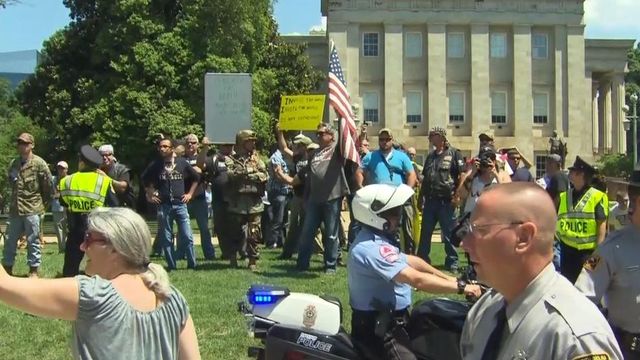Rally against Islamic law in Raleigh draws counter-protest
Demonstrations against Islamic law Saturday in Raleigh and cities across the U.S. drew counter-protests by people who said they stoked unfounded fears and a distorted view of the religion.
Posted — UpdatedThe March Against Sharia rally gathered in downtown Raleigh beginning Saturday morning around the same time the United Against Islamophobia and Racism rally assembled. Both groups were staged less than a mile from each other—the former at the State Capitol building and the latter at the Halifax Mall.
"(Islam) goes against the majority of western cultures and civilization. It is a threat to our women, mostly, more so than anything else," Orry William Von Diez said.
All protests in the Triangle Saturday ended peacefully and no arrests were made.
"This is Islamaphobic, a Muslim-phobic, it's a hate-filled attempt to deny that this is a democracy with many, many kinds of people in it," said Dieane Nelson, who was opposing the March Against Sharia.
Hundreds marched through downtown Seattle, banging drums, cymbals and cowbells behind a large sign saying "Seattle stands with our Muslim neighbors." Participants chanted "No hate, no fear, Muslims are welcome here" on their way to City Hall, while a phalanx of bicycle police officers separated them from an anti-Shariah rally numbering in the dozens.
All protests in the Triangle ended peacefully.
In front of the Trump building in downtown Chicago, about 30 people demonstrated against Islamic law and in favor of President Donald Trump, shouting slogans and holding signs that read "Ban Sharia" and "Sharia abuses women." About twice as many counter-protesters marshaled across the street.
A similar scene played out in a park near a New York courthouse, where counter-protesters sounded air-horns and banged pots and pans in an effort to silence an anti-Shariah rally.
"The theme of today is drowning out racism," said counter-protester Tony Murphy, standing next to demonstrators with colorful earplugs. "The more racists get a platform, the more people get attacked."
The rallies, held in more than two dozen U.S. cities, were organized by ACT for America, which claims Islamic law is incompatible with Western democracy.
The organization said it opposes discrimination and supports the rights of those subject to Shariah. However, the Southern Poverty Law Center, which tracks hate groups, calls it the largest American anti-Muslim group.
"I don't believe Islam can peacefully co-exist with the Constitution," said Seattle anti-Shariah demonstrator Aaron Bassford, 29. "I'm not going to tell them they can come here and take away my Second Amendment right. We need unity in this country under no ideology and no banner except the Constitution of the United States of America."
But the overwhelming majority of Muslims don't want to replace U.S. law with Islamic law, known as Shariah, and only "radical extremist groups" would call for that, said Liyakat Takim, a professor of Islamic studies at McMaster University in the Canadian city of Hamilton, Ontario.
Shariah, Takim said, refers to guidelines or principles — how Muslims should live. "Fiqh" refers to jurisprudence, or specific laws. The values embedded in Shariah do not change and are shared among Muslims, he said, while fiqh is open to interpretation and change, and in fact differs among Islamic sects and communities.
"The Quran allows slavery, so does the Old Testament. That doesn't mean we allow it today, too," he said. "Laws are amenable to change," Takim said.
The marches come amid a rise in reports of anti-Muslim incidents in the U.S., including arson attacks and vandalism at mosques, harassment of women wearing Muslim head coverings and bullying of Muslim schoolchildren.
In California, small but raucous demonstrations were held in a handful of cities, including San Bernardino, where a husband and wife inspired by the Islamic State group killed 14 people and wounded 22 in a 2015 shooting attack.
Clusters of protesters gathered on four corners of an intersection at a memorial to the slain, less than a quarter-mile from the building where the massacre occurred.
Police on foot, on horseback and in helicopters kept watch. But except for one brief moment when one group crossed the street to confront another — only to be herded back by police — there were no reports of violence and no arrests, police spokeswoman Eileen Hards said.
But it was noisy, with groups chanting, yelling and waving American flags and posters proclaiming various issues.
"There's an anti-Trump, a pro-Trump, anti-extremists, so there are a variety of messages here," Hards said. "There are so many messages going on that I'm not sure who's who."
___
Associated Press writers Andrew Selsky in Portland, Oregon; Deniz Cam in New York; Jeff Karoub in Detroit; Kimberlee Kruesi in Boise, Idaho; and Michael Tarm in Chicago contributed to this report.
• Credits
Copyright 2024 by WRAL.com and the Associated Press. All rights reserved. This material may not be published, broadcast, rewritten or redistributed.






